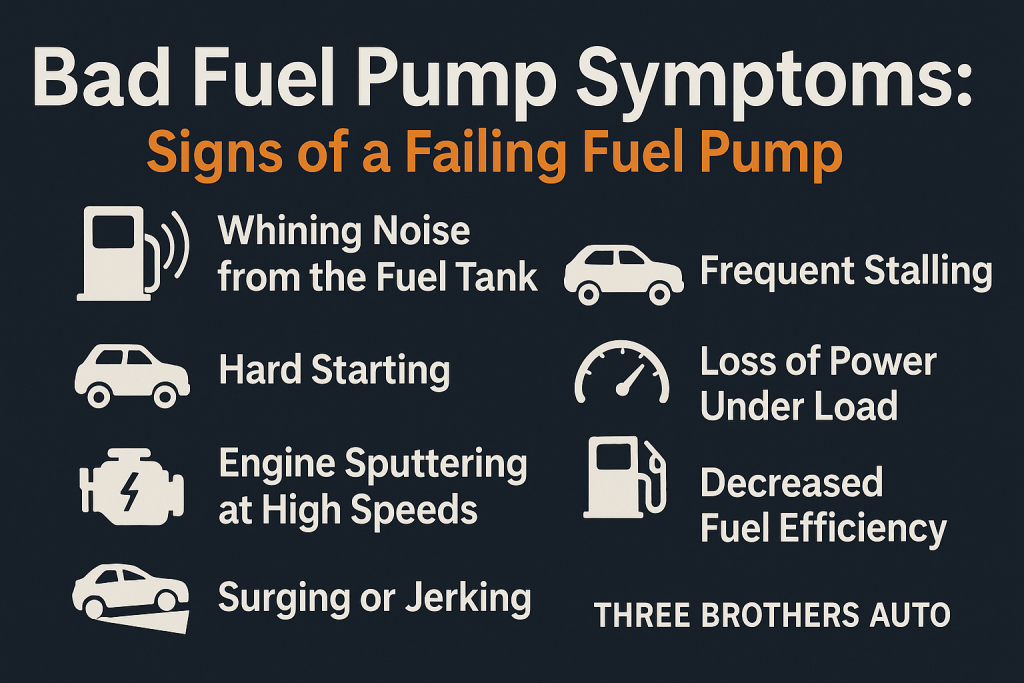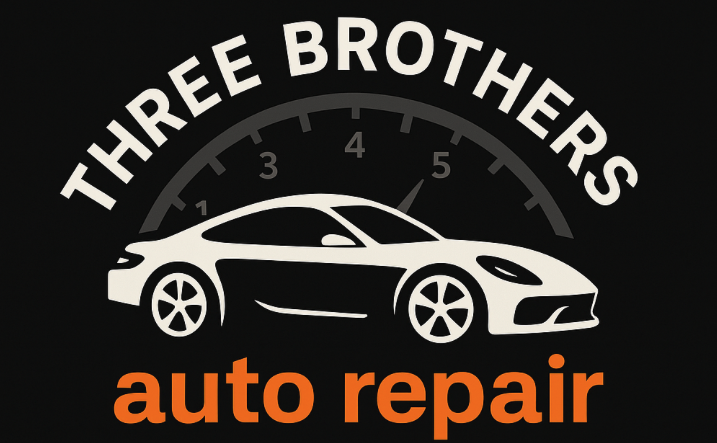Is your car acting a little off lately? One common culprit behind mysterious engine troubles is a faulty fuel pump. The fuel pump’s job is to send gasoline from your tank to your engine, and when it starts to go bad, your ride can get pretty bumpy (literally!). Fuel pumps usually last a long time (often well over 100,000 miles), but like any car part, they can wear out or fail. In this article, we’ll explain the common bad fuel pump symptoms to help you spot a failing pump early. We’ll keep things friendly and casual so every car owner can follow along.

What exactly happens when a fuel pump is on the fritz? Essentially, if the pump can’t deliver the right amount of fuel at the right pressure, your engine won’t run properly. That can lead to all sorts of performance issues. Below, we’ll go through the major symptoms of a bad fuel pump (including signs of a faulty, failing, damaged, or even leaking fuel pump) and what each feels like from the driver’s seat.
- Quick List of Common Fuel Pump Symptoms
- Whining Noise from the Fuel Tank
- Difficulty Starting the Car
- Engine Sputtering or Misfiring at High Speeds
- Frequent Stalling (Especially When Hot)
- Loss of Power Under Load (Going Uphill or Towing)
- Sudden Surges or Jolts in Speed
- Decreased Fuel Efficiency
- Fuel Smell or Leaks (Leaking Fuel Pump Symptoms)
- Car Won’t Start (Pump Completely Dead)
- Don’t Ignore the Signs – We’re Here to Help!
Quick List of Common Fuel Pump Symptoms
Not sure if it’s your fuel pump? Here are some telltale fuel pump symptoms at a glance:
-
Whining Noise from the Fuel Tank: A loud, high-pitched whine or howl from your gas tank area.
-
Hard Starting: Engine cranks but has trouble starting, or takes multiple tries to fire up.
-
Engine Sputtering at High Speeds: The car runs fine at low speed but sputters or misfires when you accelerate or drive fast.
-
Frequent Stalling: The engine suddenly stalls while driving or idling, especially when under stress or at high temperature.
-
Loss of Power Under Load: The car loses power or struggles when going uphill, towing, or carrying heavy loads.
-
Surging or Jerking: You experience sudden surges in speed (the car lurches forward) even when you’re maintaining a steady throttle.
-
Decreased Fuel Efficiency: You find yourself at the gas pump more often because of poor gas mileage.
-
Fuel Odor or Leaks: You smell gasoline or see fuel leaking under the car – potential fuel pump leak symptoms.
-
Car Won’t Start at All: In worst cases, the engine won’t start due to a completely failed pump.
If you’re noticing one or more of these, read on for details. We’ll break down each of these faulty fuel pump symptoms and explain what’s going on.
Whining Noise from the Fuel Tank
One early sign of a failing fuel pump is an unusual sound. Normally, the fuel pump makes a soft hum you’d hardly notice. But a damaged fuel pump might start making a loud whining or buzzing noise coming from your gas tank area. It may sound like an electric buzz or high-pitched whir. If you hear this whine while the engine is running or right after you turn the key on, it’s not your imagination – it could be the fuel pump motor struggling.
Why does this happen? A worn-out or faulty pump motor can get noisy when it’s working too hard or running on low fuel (gas actually helps cool and lubricate the pump). Contaminants in the fuel can also make the pump noisy. In any case, unusual fuel tank noises are bad news and shouldn’t be ignored. It’s a classic fuel pump symptom that something may be wrong. If you catch this early, you might prevent further damage.
Difficulty Starting the Car
Another common symptom of bad fuel pump trouble is having a hard time starting your engine. You might find that the engine cranks (turns over) but doesn’t start as quickly as it used to, or you need to twist the key a couple of times before it fires up. This happens because a failing pump isn’t building enough fuel pressure to start the engine promptly.
Think of the fuel pump as the “heart” of your fuel system – if it’s weak, your car might struggle to start just like you’d struggle to get going without your morning coffee. These failing fuel pump symptoms often start subtly: maybe one morning it takes a bit longer to start, and over time it gets worse. In some cases, you might have to crank the engine for a long time or press the gas pedal to get it started. If you consistently experience hard starts, don’t just blame it on a “cold morning.” It could be your fuel pump losing its oomph.
Engine Sputtering or Misfiring at High Speeds
Picture this: you’re cruising on the highway and suddenly your engine begins to sputter, cough, or misfire – as if it’s not getting enough power. That’s a scary feeling! One of the classic bad fuel pump symptoms is an engine that sputters or hesitates, especially at high speeds. What’s happening is the fuel pump can’t keep a steady stream of fuel flowing when you demand more power.
When you accelerate or drive fast, the engine needs a continuous, strong supply of gas. A faulty fuel pump might still work okay at low speeds but fail to maintain pressure at higher RPMs. The result is your engine might feel like it’s choking or skipping – you press the gas pedal and the car stutters or jerks as if it might stall out. You might also notice this when going up a hill or merging onto a fast road. This sputtering is essentially your engine saying “I’m hungry for fuel!”
If your car sputters and then recovers, take note – it’s one of those fuel pump replacement symptoms that shouldn’t be ignored. Consistent sputtering means your pump is on its last legs.
Frequent Stalling (Especially When Hot)
Does your engine randomly stall (shut off) while you’re driving or idling at a stop light? Random stalling is a major red flag and a common symptom of a failing fuel pump. This often goes hand-in-hand with the sputtering we mentioned above. If the fuel pump is inconsistent, the engine might get enough fuel one minute and then starve the next – causing a stall.
One scenario to watch for is stalling after the car has been running for a while. An old worn-out fuel pump can overheat and when it does, it might cut out and shut the engine off. You might find that the car runs fine for 15-20 minutes, then stalls unexpectedly, and maybe after it cools down it will restart. That’s a classic pattern of a weak pump motor overheating.
Stalling can be dangerous (losing power steering and brakes when the engine cuts out), so if you’re experiencing frequent stalls, get your car checked ASAP. While stalling could be caused by other issues too, a failing fuel pump is one of the usual suspects. Don’t keep driving a car that stalls regularly – it’s not safe, and it’s telling you it needs attention.
Loss of Power Under Load (Going Uphill or Towing)
Ever notice your vehicle struggling on hills or when you have a full car of passengers or cargo? If your car feels gutless and loses power in these situations, you might be seeing damaged fuel pump symptoms. When you drive uphill, tow a trailer, or carry heavy loads, the engine demands more fuel to maintain speed. A healthy fuel pump should ramp up and provide that extra fuel. But a failing pump may not keep up, causing your engine to lag or lose powerwhen it’s under stress.
For example, you press the accelerator to climb a steep hill, but instead of zipping up, the car feels like it’s straining – it might slow down or refuse to accelerate, no matter how hard you press the gas. You might even need to downshift (in a manual) or you’ll see the RPM go up but not much increase in speed. This loss of power is a key indicator that the fuel pump isn’t delivering enough fuel to match the engine’s needs.
Of course, other issues (like a clogged fuel filter or engine problems) can also cause power loss, but combined with other fuel pump symptoms, it points to the pump. If uphill drives turn into a slow crawl, have that fuel pump checked out.
Sudden Surges or Jolts in Speed
A failing fuel pump can cause weird surging issues too. This is basically the opposite of the pump not giving enough fuel – instead, it momentarily sends too much. Have you ever been driving at a steady pace and felt the car jolt forward suddenly, as if you briefly slammed the accelerator (even though you didn’t)? That’s an engine surge. It might rev up and then settle back down on its own.
Surging happens when a bad fuel pump inconsistently pushes fuel to the engine. If the pump is malfunctioning, sometimes it might deliver excess fuel, leading to a burst of power, then go back to normal or even under-deliver causing a dip in power. You’ll notice the car speeding up and slowing down sporadically, which can be both confusing and concerning.
Engine surges not only make for a jerky ride but also can be dangerous if they happen at the wrong time. If your car is surging while you drive, it’s definitely a symptom to take seriously. This kind of behavior is often tied to fuel pump issues or fuel pressure regulator issues, but either way, a mechanic should inspect it. Consistent surging is yet another faulty fuel pump symptom that suggests the pump’s internal components aren’t regulating fuel flow properly.
Decreased Fuel Efficiency
Stopping at the gas station more often than usual? A drop in your fuel economy can be one of the subtler fuel pump symptoms. When a fuel pump is failing, it can mess with the optimal fuel-air mix your engine needs. In some cases, a worn pump or a fault in the pump’s internal valve can allow too much fuel to flow into the engine. The engine can’t use all that excess fuel efficiently, so a lot of it is wasted. The result: you burn through gas quicker than normal and get fewer miles per gallon.
On the flip side, if the pump isn’t delivering enough fuel, the engine might compensate by injecting more fuel (in systems that can adjust fuel trim), which can also hurt mileage. Either way, if you notice damaged fuel pump symptoms like poor performance and a sudden change in fuel economy, the pump could be the culprit. Keep an eye on your fuel gauge; if a normally efficient car is guzzling gas, it’s time for a checkup.
Of course, many factors affect fuel mileage (tire pressure, driving habits, other engine issues), but when combined with other signs like noise or stalling, poor fuel efficiency strengthens the case for a bad fuel pump.
Fuel Smell or Leaks (Leaking Fuel Pump Symptoms)
Some fuel pump issues aren’t just about the pump weakening – sometimes the pump or its seals can leak fuel. If you have a leaking fuel pump, symptoms will be hard to miss. The most obvious sign is a strong smell of gasoline around your vehicle (aside from when you’re actually at the gas station!). You might catch a whiff when walking up to your car, or smell fuel inside the cabin, which is a serious warning sign.
Another sign of a leak is visible fuel under the car. After your car has been parked for a bit, look underneath for any wet spots or puddles that smell like gas. Keep in mind fuel is clear-ish and evaporates, so you might see just a damp spot or smell it more than see it. A leaking fuel pump (or fuel line near the pump) can drip gasoline, which is not only bad for your car’s performance but also a fire hazard – so do not ignore fuel leaks!
In addition to odor and drips, a fuel pump leak can cause low fuel pressure, leading to many of the performance problems we’ve talked about: hard starts, stalling, and poor acceleration. Essentially, a leak means not all the fuel is reaching the engine. If you suspect a fuel leak, get your vehicle looked at immediately for safety reasons. Fuel pump leak symptoms should be addressed before driving much further.
Car Won’t Start (Pump Completely Dead)
All the symptoms above are early warnings. But what if things progress and you hit the worst-case scenario? A completely failed fuel pump means your car won’t start at all. You’ll turn the key and the engine will crank and crank, but it won’t catch fire because no fuel is reaching the engine. This is the ultimate of bad fuel pump symptoms – effectively a dead car. Often, before reaching this point, you’d have noticed the hard starting or sputtering getting progressively worse. If those were ignored, one day the pump may give out entirely.
Now, a no-start condition can be caused by many things (bad battery, bad starter, ignition problems, etc.), so you’d want a proper diagnosis. But if you’ve also had other fuel pump symptoms like noise or stalling beforehand, then a no-start could indeed mean the pump has given up. We call these the “fuel pump replacement” symptoms – when it’s pretty clear the pump has failed and needs to be replaced. Essentially, if everything else (battery, spark, etc.) checks out, a car that cranks but doesn’t start is often not getting fuel. A mechanic can verify this by testing fuel pressure.
If you find yourself with a non-starting car and suspect the fuel pump, it’s time to take action (likely a tow to the repair shop, unfortunately). The good news is, replacing a bad pump with a new one will get your vehicle running smoothly again, and you’ll immediately notice the difference.
Don’t Ignore the Signs – We’re Here to Help!
Fuel pump issues can start off subtle but tend to get worse over time. The key is to catch the faulty fuel pump symptoms early before you end up stranded. If you’ve noticed any of the warning signs above, it’s a good idea to have your fuel pump (and fuel system) checked out by a professional.

At Three Brothers Auto Repair, we can replace your failing fuel pump if needed and get your car running reliably again. We pride ourselves on honest, high-quality service – we’ll explain the problem in plain language and get you back on the road with confidence.
Call us or stop by if you’re experiencing fuel pump troubles, or even if you just have questions. Your car’s performance and your peace of mind are our top priorities. Don’t let a bad fuel pump cramp your style – let our team take care of it so you can drive worry-free!
